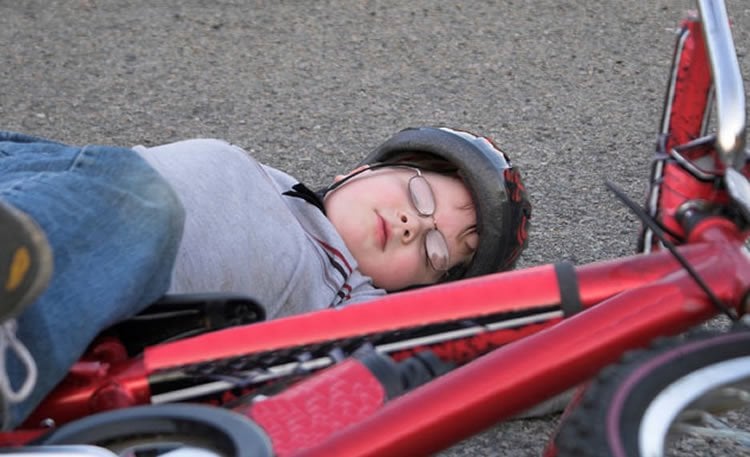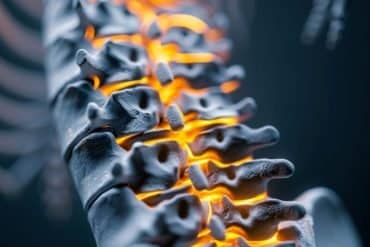Parents should watch for emotional and behavioural changes in their children.
The incidence of concussion is particularly high in the preschool years – up to around 2% of children aged 0 to 5 years per year. A study by researchers at CHU Sainte-Justine mother-child research hospital (affiliated with the University of Montreal), recently published in the Journal of Neuropsychology, reveals the adverse effects of mild traumatic brain injury (mTBI) on the quality parent-child relationships. “The young brain is particularly vulnerable to injury because the skull is still thin and malleable. In the months following the injury, one of the first visible signs of social difficulties in young children is a decline in their relationship with their parents,” said Miriam Beauchamp a researcher at Sainte-Justine, professor of psychology at the University of Montreal and senior author of the study. Knowing that good parent-child relationships are synonymous with better social skills later in life, the researchers stress the importance for parents to monitor behaviour changes in their child in the weeks that follow the trauma and adjust accordingly during this period.
Given the relatively limited social and cognitive skills of preschoolers, a concussion at this age can slow the development of new abilities, for example, certain communication skills. “Very little data exists about the first signs of socialization problems in preschoolers after a concussion. Parent-child relationships represent the center of young children’s social environments and are therefore ideal contexts for studying the potential effects of mTBI on children’s social functioning,” said Gabrielle Lalonde, BSc, a doctoral student and first author of the study.
The laboratory recruited a group of 130 children aged between 18 months and 60 months, divided into three categories: children with concussion, children with orthopedic injury (usually a fracture or sprain of the arm or leg) but no concussion, and a control group of non-injured children. The aim of the study was to assess the quality of parent-child interactions six months post-injury. “We asked parents to fill out a questionnaire so they could evaluate their relationship with their child. At the same time, they participated in a filmed evaluation session in the laboratory in which they and their children took part in typical daily activities – such as free play and snack time – allowing the researchers to measure the quality of their communication, cooperation, and the emotional atmosphere,” said Miriam Beauchamp. “The quality of parent-child interactions following concussion was significantly reduced compared to non-injured children.”

“Given that parent-child interactions are influenced by the emotional and behavioural dispositions of both the parent and the child, more research is required to identify the factors underlying this decline in their relationship. It may be due to specific neurological mechanisms, to changes in parenting, or to stress caused by the injury. Identifying these factors will help develop more targeted interventions to positively influence the quality of life of children and their families,” said Lalonde.
“If, as parents, you notice the effects of the accident on your own psychological state, or behavioural changes in your child that make them interact differently and that persist more than a few weeks, you should talk to your family doctor or a neuropsychologist,” said Beauchamp.
Miriam Beauchamp, PhD, is a researcher at the CHU Sainte-Justine Research Center. She leads the ABCs Developmental Neuropsychology Laboratory, and is Associate Professor in the Department of Psychology at University of Montreal. She is research scholar of the Fonds de recherche Santé – Québec (FRQS). Her study was financially supported by the Canadian Institutes of Health Research (CIHR), and her laboratory equipment was funded throught the John R. Evans Leaders Fund of the Canada Foundation for Innovation (CFI). Gabrielle Lalonde, BSc, is a doctoral student under the direction of Miriam Beauchamp.
Source: Marise Daigle – University of Montreal
Image Credit: The image is adapted from the University of Montreal press release.
Original Research: Abstract for “Investigating social functioning after early mild TBI: the quality of parent–child interactions” by Gabrielle Lalonde, Annie Bernier, Cindy Beaudoin, Jocelyn Gravel, and Miriam H. Beauchamp in Journal of Neuropsychology. Published online March 24 2016 doi:10.1111/jnp.12104
Abstract
Investigating social functioning after early mild TBI: the quality of parent–child interactions
The young brain is particularly vulnerable to injury due to inherent physiological and developmental factors, and even mild forms of traumatic brain injury (mTBI) can sometimes result in cognitive and behavioural difficulties. Despite the high prevalence of paediatric mTBI, little is known of its impact on children’s social functioning. Parent–child relationships represent the centre of young children’s social environments and are therefore ideal contexts for studying the potential effects of mTBI on children’s social functioning. The aim of this study was to assess the quality of parent–child interactions after mTBI using observational assessment methods and parental report. The sample included 130 children (18–60 months at recruitment) divided into three groups: children with uncomplicated mTBI (n = 47), children with orthopaedic injury (OI, n = 27), and non-injured children (NI, n = 56). The quality of parent–child interactions was assessed 6 months post-injury using the Mutually Responsive Orientation (MRO) scale, an observational measure which focuses on the dyadic nature of parent–child exchanges, and the Parental Stress Index questionnaire (Parent-Child Dysfunctional Interaction (PCDI) domain). Significant differences with medium effect sizes were found between the mTBI group and the NI group on the MRO, but not between the OI group and the other two groups. PCDI scores did not differ across groups, suggesting that observational measures may be more sensitive to changes in parent–child interactions after TBI. The current findings have implications for children’s post-injury social development and highlight the importance of monitoring social outcomes even after minor head injuries.
“Investigating social functioning after early mild TBI: the quality of parent–child interactions” by Gabrielle Lalonde, Annie Bernier, Cindy Beaudoin, Jocelyn Gravel, and Miriam H. Beauchamp in Journal of Neuropsychology. Published online March 24 2016 doi:10.1111/jnp.12104






